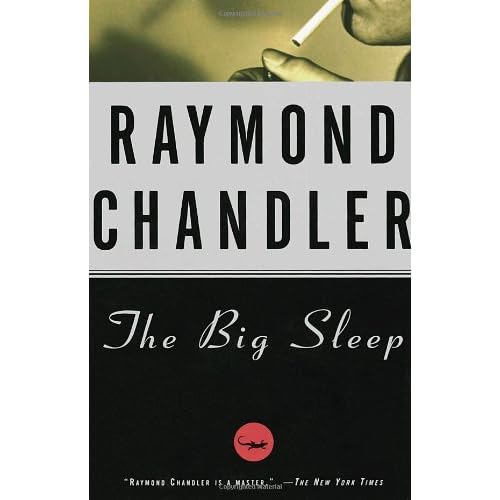
Well, now that I've wrapped up all of Laurie King's Russell & Holmes novels currently available in paperback, I've decided to read all of Raymond Chandler, which I've never done before. His first novel, The Big Sleep, followed more than a dozen short stories churned out for one pulp adventure magazine or another in the 1930s, where he perfected his vibe of a weary, downcast world of ugly people and shady secrets. Then he used plot elements from these stories to fashion longer novels, which startled the critical establishment when they learned anybody who wrote for those sorts of magazines could turn out to be one of the finest wordsmiths in the English language, and one of the most important of all American writers.
The great thing about reading this book is how it shows up the film version with Bogart and Bacall to be hopelessly miscast and wrongheaded. Oh, don't get me wrong, it's a terrific movie. So is the 1970s Long Goodbye, but it's not a faithful adaptation of its source either, and neither Elliot Gould nor Bogart were right to play Philip Marlowe.
There's a scene towards the end where Marlowe reflects that either creating or believing in fiction is much easier than relating or accepting the truth, a maxim that I wish I had remembered some four years back when my life got turned upside down by somebody's lies. It was an event which really changed my life for good, and made it so much more difficult for me to trust or embrace anybody. I wonder whether Marlowe experienced anything similar. The bulk of the book is based around his search for the truth; his obligation to General Sternwood is concluded pretty early on, and most men in his position would drop things, but there is much more in good detective fiction than simply closing cases. Marlowe gets his hands dirtier and dirtier as the bodycount rises, but he has to. Nobody else will.
It's a great pleasure to reacquaint myself with the master. I've never read the next three books in the series before, and am really looking forward to it.
3 comments:
But what did you think of King's "Locked Rooms"?
who killed the chauffeur?
-chetbakerfan
Anonymous, I liked it a lot. I think it was better than the previous 2-3 books in the series.
CBF, I figure that Marlowe would've found out in time, but I think he'd had enough of Carmen Sternwood to make that truth one not worth the headache!
Post a Comment